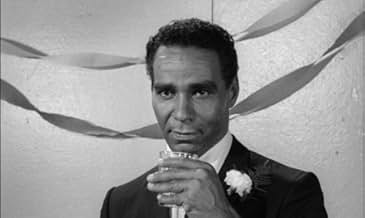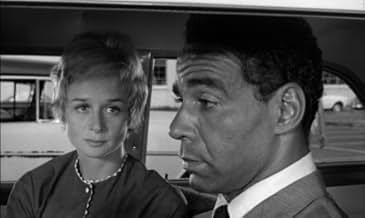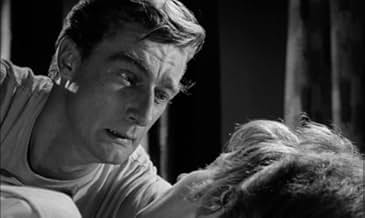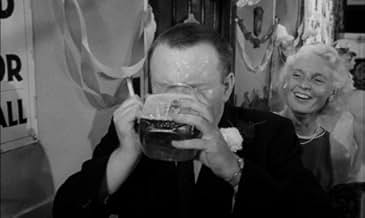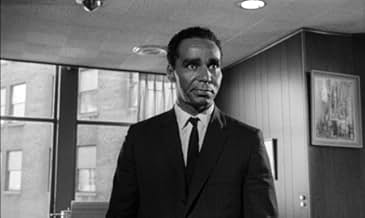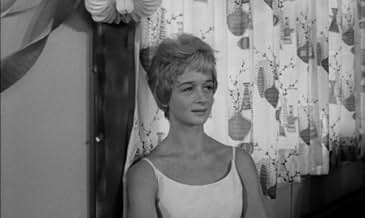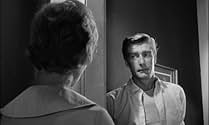ÉVALUATION IMDb
7,2/10
980
MA NOTE
Étude du mariage interracial dans les années 1960 montrant les préjugés de l'époque.Étude du mariage interracial dans les années 1960 montrant les préjugés de l'époque.Étude du mariage interracial dans les années 1960 montrant les préjugés de l'époque.
- Nommé pour 1 oscar
- 2 victoires et 4 nominations au total
Martha L. Mericka
- Ellen Mary
- (as Marti Mericka)
Vinnette Carroll
- Martha Richards
- (as Vinette Carroll)
Anthony Spinelli
- Johnny Hruska
- (as Sam Weston)
Kenny Bass
- Orchestra Leader
- (uncredited)
Joel Ehrlich
- Bart
- (uncredited)
Dick Flaisman
- Saxophone Player
- (uncredited)
Doris Helsel
- Minister's Wife
- (uncredited)
Paul S. Orgill
- Lawyer
- (uncredited)
Bea Pestotnik
- Wedding Guest
- (uncredited)
John Pestotnik
- Wedding Guest
- (uncredited)
Avis en vedette
"One Potato, Two Potato" is a very low budget production that made a bit of commotion back when it debuted in 1964. Despite its lowly pedigree (it was filmed in the Cleveland area and the actors were mostly unknowns at the time), the lead actress (Barbara Barrie) received the Best Actress award at Cannes and the film was nominated for an Oscar (Best Writing, Story and Screenplay - Written Directly for the Screen). Sadly today, it's a pretty obscure picture.
Julie (Barrie) is a divorced mother of a young girl. The father abandoned them years ago and Julie works at the company where Frank (Bernie Hamilton) works. The meet and through the course of spending time together, they find that there is an attraction. Eventually, they decide to get married--even though they realize it might cause a few heads to turn. After all, she is white and he is black. Despite a bumpy start, things work out and the young family prospers and grows. Things look pretty good, right? Well, they do until the child's biological father shows up unexpectedly. Now the man (?) wants his daughter--mostly because his ego cannot stand that his ex- is with a black man.
This is a well made film but I must warn you that it will rip your heart out. This is NOT a complaint. Heck, back in 'the good old days', it was STILL illegal for blacks and whites to marry in many southern states and in others it was quite possible to lose custody of a child simply because you married someone of another race. Crazy...and pretty stupid. So, it's great that the movie draws attention to it. My only complaint is that the film, while very interesting, is way underplayed--too underplayed. Some more emotion in the acting and relationship between Frank and Julie would have made the movie better overall.
Julie (Barrie) is a divorced mother of a young girl. The father abandoned them years ago and Julie works at the company where Frank (Bernie Hamilton) works. The meet and through the course of spending time together, they find that there is an attraction. Eventually, they decide to get married--even though they realize it might cause a few heads to turn. After all, she is white and he is black. Despite a bumpy start, things work out and the young family prospers and grows. Things look pretty good, right? Well, they do until the child's biological father shows up unexpectedly. Now the man (?) wants his daughter--mostly because his ego cannot stand that his ex- is with a black man.
This is a well made film but I must warn you that it will rip your heart out. This is NOT a complaint. Heck, back in 'the good old days', it was STILL illegal for blacks and whites to marry in many southern states and in others it was quite possible to lose custody of a child simply because you married someone of another race. Crazy...and pretty stupid. So, it's great that the movie draws attention to it. My only complaint is that the film, while very interesting, is way underplayed--too underplayed. Some more emotion in the acting and relationship between Frank and Julie would have made the movie better overall.
9tavm
One Potato, Two Potato is a compelling drama about the interracial troubles concerning child custody
Continuing to review African-Americans in film in chronological order for Black History Month, we're once again in 1964 when another independent film is made to address the issues of the day, this time being about controversial interracial marriage and the ramifications of an ex-husband wanting custody of a child because of it. Dark-skinned Frank Richards (Bernie Hamilton) falls for Caucasian Julie Cullen (Barbara Barrie) and her little girl Ellen Mary (Marti Mericka). Though his parents William (Robert Earl Jones) and Martha (Vinnette Carroll) have warned him what to expect, Frank goes through with the plans. Then when Julie's former spouse Joe Cullen (Richard Mulligan) shows up and he finds out what's what, he decides for himself what's best for Ellen Mary despite not having seen her in four years. The final decision is left to Judge Powell (Harry Bellaver). I'll stop there and just say that this is a very compelling drama about a real-life issue at the time. The only flaw I can think of is we're never really shown how much Ellen Mary loves Frank despite her saying so to Joe who first appears bringing a Teddy Bear and playing shoot-'em-up with her despite his being a stranger at the time. Every cast member is excellent and how funny is hearing that familiar voice of James Earl Jones coming from his father, Robert! So on that note, One Potato, Two Potato comes highly recommended. P.S. Among the players from previous movies I so far reviewed for this month: Hamilton from The Jackie Robinson Story and Take a Giant Step, Robert Earl Jones from Lying Lips and Odds Against Tomorrow, and Harry Bellaver from Sidney Poitier's No Way Out. Oh, and Ms. Barrie and Mr. Bellaver are from my birth state of Illinois, Barbara from Chicago and Harry from Hillsboro.
This film is simply shot and compellingly told. Its stars Barbara Barrie before she became a star and features an excellent cast including a performance by a child that is so touching. I saw it as a kid with my mother and was very moved by it. I count it as one of my favorite films. I haven't seen it in years and am curious to see if I would still find it as moving. As another reviewer on this site stated, the ending is gut wrenching and I concur. I would love to buy it and show it to a film class I teach but sadly it is not available. It is one of those black and white American Kammerspiel films of the 1960s (along with A Thousand Clowns, Ladybug, Ladybug, David and Lisa) that were well received at the time of their release but are now forgotten). I don't know how one goes about getting distributors to transfer these films to DVD and make them available but if anyone knows please push for this film.
Maybe it was the racially charged era of the early Civil Rights struggle, or maybe it was because I was a young mother with a child the same age as the one in the movie, but this was one of the most powerful movies I have ever scene. Today, 40 years later, I am still moved whenever I see Barbara Barrie, even if it is in a situation comedy on TV. Certainly, she captured the role of the white mother married to a black man in a racist society. All the other actors performed admirably, the actor playing the second husband was appealing. It was believable that a co-worker would have found him attractive and would have fallen in love, even given the tenor of the times. While the writing may have presented the story a bit "over the top", this movie went beyond civil rights "propaganda", and presented real people dealing with a difficult situation. It certainly was real to me....I had to be led out of the cinema in tears when it ended. A high recommendation!!!
10crsytt
I saw this movie in the mid-60s in a theater and the last scene was heart-wrenching. I felt like I had been hit by a baseball bat. Several years later I saw the movie on TV and was surprised to find that, as that final scene approached, I could feel the same emotions building. The movie had not lost its effect! I would love to watch this movie again to see if it would have the same impact. It would be interesting if young people today would see the power of this film or if, because "things have changed," the story line would seem outdated. Apparently this film is NOT available on video, unfortunately. I wonder why? Who makes that decision?
Le saviez-vous
- AnecdotesIntermarriage between African-Americans and Caucasians was illegal in 16 states until the US Supreme Court decision Loving v. Virginia was handed down on June 12, 1967. The court unanimously ruled that anti-miscegenation marriage laws were unconstitutional. In his opinion, Chief Justice Earl Warren wrote, "The freedom to marry has long been recognized as one of the vital personal rights essential to the orderly pursuit of happiness by free men. Marriage is one of the 'basic civil rights of man, fundamental to our very existence and survival. To deny this fundamental freedom on so unsupportable a basis as the racial classifications embodied in these statutes, classifications so directly subversive of the principle of equality at the heart of the Fourteenth Amendment, is surely to deprive all the State's citizens of liberty without due process of law. The Fourteenth Amendment requires that the freedom of choice to marry not be restricted by invidious racial discriminations. Under our Constitution, the freedom to marry, or not marry, a person of another race resides with the individual and cannot be infringed by the State." Interestingly, many anti-miscegenation marriage laws were enacted in the wake of African-American heavyweight champion Jack Johnson's marriages to two Caucasian women, as pointed out in Ken Burns' documentary Unforgivable Blackness: The Rise and Fall of Jack Johnson (2004). Johnson married his white mistress Etta Duryea in late 1910 or early 1911, then married another white woman, Lucille Cameron, soon after his first wife's September 1911 suicide. The two marriages outraged white America, and Johnson and Cameron fled America for Canada and then Europe under threat of lynching. Their relationship was fictionalized in the stage play, and subsequent movie, L'insurgé (1970), for which the Caucasian playwright Howard Sackler won the Pulitzer Prize. The 1913 Massachusetts anti-miscegenation marriage law, which did not recognize any marriage made in a state forbidding the marriage of different classifications of people (the law left unspoken the racial issue of black and white; in Virginia, blacks were allowed to marry other, non-white "races"), was considered inoperative after Loving v. Virginia until in 2005, then-governor Mitt Romney used it as the basis to deny out-of-state couples the right to wed in the Commonwealth of Massachusetts after the Bay State's Supreme Court legalized gay marriage.
- Citations
Jordan Hollis: What do I have to kid you for. I could get a black eye out of a case like this. What the Hell did you have to come to me for? Why do you have to do this to your friend?
- ConnexionsFeatured in C'est assez noir pour vous?!? (2022)
Meilleurs choix
Connectez-vous pour évaluer et surveiller les recommandations personnalisées
- How long is One Potato, Two Potato?Propulsé par Alexa
Détails
- Date de sortie
- Pays d’origine
- Langue
- Aussi connu sous le nom de
- One Potato, Two Potato
- Lieux de tournage
- Painesville, Ohio, États-Unis(".............where this picture was shot in its entirety, our thanks.")
- société de production
- Consultez plus de crédits d'entreprise sur IMDbPro
Box-office
- Budget
- 340 000 $ US (estimation)
- Durée1 heure 23 minutes
- Couleur
- Mixage
- Rapport de forme
- 1.37 : 1
Contribuer à cette page
Suggérer une modification ou ajouter du contenu manquant

Lacune principale
What is the English language plot outline for Le procès de Julie Richards (1964)?
Répondre
